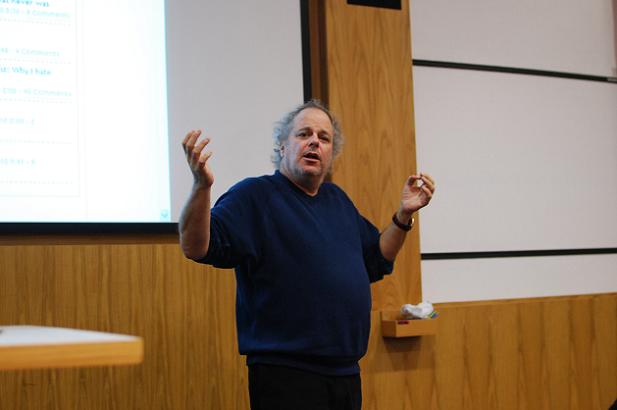Modern Times: Playing to Win
Modern Times, New in Ceasefire, Profiles - Posted on Tuesday, November 2, 2010 0:00 - 0 Comments
Michael Albert at during his Ceasefire Session, Nottingham, UK (31 Oct-01 Nov 2010) (Photo: Corin Faife)
By Corin Faife
This weekend I was fortunate enough to meet esteemed activist Michael Albert. It was October 31st, and I arrived mid way through his Ceasefire Sessions seminar with my face painted to resemble a rather haunting skull. It passed without comment, but there have certainly been more auspicious introductions.
Over the course of three hours spent fielding questions on his political philosophy, peppered with anecdotes from his personal travels in Venezuela and Argentina and years-long association with Noam Chomsky, he shared many insights from years of involvement with the activist scene. Though delivered in congenial tone with slow and considered meter, his words didn’t shy from controversy, never more so than when stating truths that are skirted for fear of drawing fire.
Truths like: the Left must pick itself up and play to win.
Play to win, not fail with style. Not smile wearily at one another as we “fight the good fight”, not take relish in throwing ourselves into defeat knowing that “at least we tried”, but really play the game to win.
Sometimes it takes a great thinker to tell you the blindingly obvious. It’s easy to forget that we can’t complete the project of building a more equitable society if we don’t have confidence in ourselves, and easy to overlook the need for reminding ourselves that it is possible, even when the odds seem overwhelming.
Of course, we’re meant to think the odds against us are overwhelming. All oppressive systems seek to preclude attempts at resistance and maintain existing structures: sometimes through formal mechanisms, legal restrictions on the right to criticise or politicial frameworks which concentrate power in the hands of the few, and sometimes through the propaganda telling us resistance is futile, that it’s all for our own good. In a society like our own, elite run and unjust but with high freedom of expression, it’s especially important to convince the population that There Is No Alternative or else somebody might just create one.
To counter, we must play on ourselves a trick of perspective. To look into an uncertain future with only a conception of how large the struggles may be is disheartening. But try to project yourself fifty, or one hundred years into the future, and can we really believe the current system will remain unchanged?
In 1987, when Margaret Thatcher was denouncing as preposterous the idea that the ANC could ever overthrow white South African rule, the task must have looked daunting for the thousands of anti-apartheid activists languishing in jail, not least a certain Nelson Mandela. For the slavery abolitionists, the suffragettes, the followers of Dr. King or Gandhi-ji, the odds must have at some stage seemed insurmountable, though for us their years of soul-searching and struggle are transmuted into a won battle, historical fact.
For us the dawning years of the 21st Century have been uncertain, but future generations will regard them in retrospect and judge that the victory of the Left was a fait accompli. Twenty years hence it might seem ‘painfully obvious’ that revolution in Venezuela would spread throughout the Americas, that the financial crisis of 2008 heralded the death of market capitalism or that the internet would enable workers’ management without the need for corporate hierarchy. We won’t know what hindsight will tell us until we get there and look back.
Now keep that in mind, and let’s play to win.
Corin Faife is a writer and activist. His ‘Modern Times’ column will appear every first Tuesday of the month.



Leave a Reply